History of "The Victors"
Timeline of the Origins and Early Performances of “The Victors March”
by Joseph Dobos, ’71
Before reading one word of this article, please know how genuinely I love “The Victors”.
During my student years at Michigan, 1967-72, I played the organ at the Sunday noon mass at Saint Mary’s Student Chapel. If Michigan was victorious the day before, I found ways to insert phrases from “The Victors” into the inner voices of the hymns. The noon mass, by the way, was the mass that Bill and Mary Revelli attended. One Sunday, I made “The Victors” quotation a little too obvious in the hymn, “Crown Him With Many Crowns”. After mass, Dr. Revelli came up to the organ loft to find out who was responsible for this trickery. He saw me, and said, “Oh! It’s YOU!” I was a freshman in the Marching Band, but he did not know my name. He recognized me only as the 17th chair clarinet player. That was the beginning of my relationship with the William Revelli.
For the rest of my life, I continued playing the organ in church, and still, I celebrate important Michigan victories by putting references from “The Victors” into the hymns. In 1994, at the national convention of the Organ Historical Society, I performed an organ recital that ended with Jerry Bilik’s “Organzation: Victors in the Style of J.S. Bach”.
In my old age I started to run the annual 10-mile Crim Race in Flint, Michigan. At my first race, I was dying by Mile Six. As I ran past a residence where the owner was blasting “The Victors” onto the street, I was inspired and found renewed energy in my legs that enabled me to finish the race! I love “The Victors”.
In 1981, Rich Alder and I visited with Band Alumnus, George Anderson. George was a student manager of the Michigan Band during the years of transition from Nicholas Falcone to William Revelli. We wanted to learn more about that critical time of Michigan Band history. During our conversation, George said something to the effect of “You know, Louis Elbel did not write ‘The Victors’”. (WHAT?) George explained that the trio of our “Victors” is nearly identical to a march that was written and published one year before the famous football game that inspired Elbel to write his march. The march he referred to was “Spirit of Liberty” by George Rosey.
Rich and I could not wait to meet with Dr. Revelli to ask if he knew about Rosey and the “Spirit of Liberty” march. When we asked him, he replied, “Oh, yes!” He acted as if this were old news. He opened a drawer of his desk and pulled out the music to “Spirit of Liberty”. And there it was! The trio of “Spirit of Liberty” is our “Victors”. Revelli explained that somewhere, somehow, Elbel must have heard George Rosey’s march and used this tune in his “Victors”.
The following is a timeline that tells the story of these two marches and their composers.
| Date | Event |
|---|---|
| May 30, 1879 | The University of Michigan’s first intercollegiate football game took place on May 30, 1879 when Michigan played against the “Purple Stockings” from Racine College (Wisconsin). The game was played in Chicago at the White Stockings' grounds in Lakefront Park which, today, is part of Grant Park. The Chicago Daily Tribune called it "the first rugby-football game to be played west of the Alleghenies.” The weekly newspaper at the University of Michigan, the Chronicle, called it "the finest game of Rugby football ever played this side of the Alleghenies. The game consisted of two "innings" of 45 minutes each. Midway through the first inning, Irving Kane Pond scored the first touchdown in Michigan football history. The crowd responded with cheers of "Pond, forever!"" Besides being a popular athlete on campus, Pond was equally well known as a fine musician. Pond played percussion in the University student orchestra. After graduation, Pond became a prominent architect in Chicago and designed some of the Windy City’s first skyscrapers. In Ann Arbor, Pond was the architect of the Michigan Union and the Michigan League. During the 1920s, there was much discussion as to when the University of Michigan Band began, Irving Pond, unequivocally stated that there was no student band on campus before 1896. |
| July 11, 1882 | In Chicago, the Pullman Band was organized as part of George Pullman’s vision to make his Utopian town of Pullman and Pullman (train) Car Factory a better place for his workers to live. Jacob F. Hostrawser, a timekeeper in the Pullman factory, was appointed conductor. |
| 1894 | In 1894 the Pullman Band became formally identified with the Illinois First Regiment, Illinois National Guard. From this time forward, the Pullman Band traveled with the Regiment as well as representing the Pullman town and factory in local, state, and country-wide performances. |
| 1896 | “A Hot Time in the Old Town”, an American ragtime song and march, was composed by Theodore August Metz with lyrics by Joe Hayden. Metz was the band leader of the McIntyre and Heath Minstrels. An incident that occurred in a place called Old Town resulted in the composition of “Hot Time”. When the train carrying the minstrel show arrived in Old Town, Theodore Metz look out from his train window and saw a group of children playing with fire near the tracks. A member of the show remarked “There’ll be a hot time in the old town tonight!” Amused, Metz jotted down the remark on a piece of scrap paper, and on the next day, he wrote the music to what would be known “A Hot Time in the Old Town Tonight”. It became the trademark song of the minstrel show. Soon, it became one of the most well-known songs in America. |
| November 13, 1896 | Harry dePont and Ray P. Warren organized the first University of Michigan Band. At the first rehearsal, Ray Warren was named the conductor. |
| February 22, 1897 | The University of Michigan Band gives its first public performance at the University’s annual Washington Day convocation. |
| October 2, 1897 | The first performance of the University of Michigan Band at a football game occurred on this date when the University of Michigan played Michigan Normal on Regents Field which stood where Schembechler Hall now stands. Lewellyn L. Renwick, an organ instructor from the School of Music conducted the band. At the time, the School of Music was a private conservatory and was not affiliated with the University of Michigan. “Hot Time” was popular on college campuses across the country. Many schools—including the University of Michigan—adopted the tune as their football victory march. (It is still used as such by the University of Wisconsin Band.) When sung at University of Michigan football games, lyrics with a Michigan flavor were sung. In fact, the lyrics were changed each week to reflect the opposing school’s team. At the football games, the two most favorite songs that the University of Michigan Band played were “The Yellow and the Blue” and “Hot Time in the Old Town Tonight”. In reference to popularity of “Hot Time”, Harry dePont wrote, “Most of the time that was all we played after a game.” |
| April 11, 1898 | George Rosey (Rosenberg), a well-known composer from New York’s Tin Pan Alley, composed and published the “Spirit of Liberty March and Two-Step” as a piano solo. Rosey was an immigrant from Germany. Like his contemporary, John Philip Sousa, Rosey was known as a composer of marches and two steps for band. Many of his ragtime compositions were best sellers. The application for the copyright of Spirit of Liberty was submitted on April 11, 1898. Subsequently, two copies of the piano solo were submitted on April 26, 1898. (Note the trio.) |
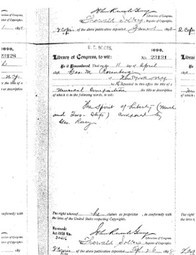 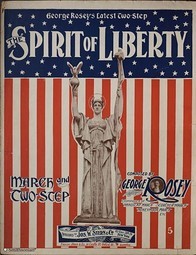 Application for the copyright of “Spirit of Liberty’ march and cover page. |
|
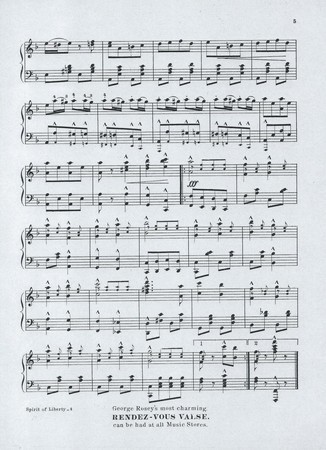 Trio of "Spirit of Liberty" by George Rosey Soon, a band arrangement of “Spirit of Liberty” was made by George Wiegand and published by Joseph Stern. (The trio of “Spirit of Liberty” was pitched in A flat major.) During the Civil War, Wiegand played cornet in military bands from both the north and the south. Wiegand was Edwin Franko Goldman’s cornet teacher. (Goldman would become a mentor to William Revelli.) Wiegand also played viola in the Theodore Thomas Orchestra of Chicago. (Theodore Thomas would become the founder and first musical director of the Chicago Symphony Orchestra.) |
|
| June 25, 1898 | “Spirit of Liberty” was performed in San Francisco by the Boston Elite Orchestra, conducted by Leo Bruck. Thus, in a short span of time, Rosey’s march was heard on both coasts. |
| October 27, 1898 | The “Spirit of Liberty” was performed in Chicago on October 27, 1898 by the First Regiment Band, aka Pullman Band, Jacob Hostrawser, conducting.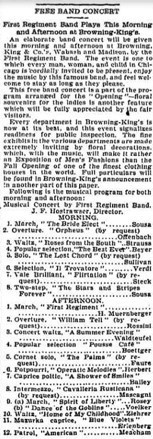 Chicago Tribune: October 27, 1898 |
| November 24, 1898 | At Marshall Field, in Chicago, the University of Michigan football team defeated arch-rival, the University of Chicago, with a final score of 12-11. At the game, the University of Michigan Band was present. Because the University of Chicago did not have a band, the Pullman Band was hired to represent the university. Inspired by the University of Michigan's victory, Louis Elbel composed what would be known as the trio of The Victors. Louis Elbel, a 21-year-old student from the University of Michigan, was among the 12,000 spectators who witnessed the game. A native of South Bend, Indiana, Elbel had been a student at the University of Michigan since the fall term of 1896. On campus, he was prominent “both musically and athletically.” During his freshman and sophomore years, Michigan football teams suffered consecutive losses to the University of Chicago. A loyal football fan and cheerleader at the games, Louis Elbel argued that “there was not a sadder Michigan man there than when we lost to Chicago.” Thus, the victory on that Thanksgiving Day 1898, over Chicago, was much relished by Michigan students.  Elbel’s eyewitness account reveals the excitement of the post-game revelry on the streets of Chicago: “Our crowd gathered at the South end of the field and when we got out on the street, we felt we should have a special celebration. In the gathering dusk, we commandeered our “Michigan” band. Some three to four hundred fellows started a procession circling the Chicago campus up to 61st Street around and back—the happiest crowd of fellows you’d ever see. It was starting to get dark, and the band had no lights, so they started with “A Hot Time in the Old Town Tonight” and blared it all around that campus. I guess we were too jubilant to mind. Anyway, we got back to our starting point and disbanded. I guess I was too happy to be bushed. And, I had a long way to go then, because I was due to go to my sister’s in Englewood, a distance of about one and a half miles.” Years later, a member of the 1898 University of Michigan Band acknowledged that many of the musicians in the band were not sober during the postgame celebration that night on the campus of the University of Chicago. After the postgame celebration, as Louis Elbel walked to his sister’s house in Hyde Park, he began thinking that Michigan “didn’t have the right celebration song that night.” To his reasoning, Michigan needed a “fitting paean, a clarion call—something simple, but grand and heroic, something to let out on.” Along the way, Elbel claimed that his “walk turned into a march.” Elbel later recalled that “a band got to singing in my head—a sort of victory sound—and right there, the refrain of “The Victors” came to me—not only the music, but the words.” When he arrived at his sister’s house, he wrote down the notes of the tune that the band in his head was “singing”. The next day, Elbel went to his parent’s home in his hometown, South Bend, and there, he tried out the song on the piano and finished the entire refrain. This refrain, which would become the trio of “The Victors” march, was nearly identical to the trio of George Rosey’s “Spirit of Liberty” march—the difference being in the final phrase. In his book “The Heritage of Encyclopedia of Band Music”, William H. Rehrig claimed that Elbel and Rosey “were reported to be good friends, and this arrangement was presumably made by mutual agreement.” This assertion was refuted by Louis Elbel’s nephew, Fred, who wrote “I am sure my uncle did not know him or about him – visually, verbally or aurally. I hadn’t either.” Since the publication of his book, Rehrig has agreed that his initial claim should be corrected. Because the Pullman Band had performed “Spirit of Liberty” only four weeks earlier, it is possible that Rosey’s march was played at the Michigan-Chicago football game. |
| November 25, 1898 | On the train ride back to Ann Arbor, Louis Elbel conceived the idea of writing a "big march" and sketched out the music that would become “The Victors” with an introduction, first strain, second strain, trio, and break up strain. During the 1890s, marches arranged for piano, especially those of E. T. Paull, were popular with the music buying public. A superb pianist, Elbel was well acquainted with these piano marches that were sold in the family music store in South Bend. Elbel was well acquainted with the traditional march form. |
| Early months of 1899 | At his brother’s suggestion, Louis Elbel arranged to have “The Victors” published as a piano solo by Elbel Brothers, the family owned business. The march was dedicated to the “Michigan Team of 1898”.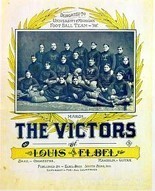 At about the same time, Elbel took his march to the conductor of the City Band of Detroit, E. R. Schremser, and paid him to orchestrate it for band. (In this endeavor, he received some financial support from Professor Paul dePont, the father of Harry dePont, one of the founders of the University of Michigan Band.) Edward R. Schremser, Jr., the son of a New York City musician, was also the leader of the 4th Regiment Band in Detroit. During the winter months of 1899, at various small social gatherings in Ann Arbor, Elbel played “The Victors” on the piano and sang the chorus for his friends. He was pleased that his new march made “quite an impression.” |
| April 1899 | The Schremser band arrangement of “The Victors” was finished. |
| April 5, 1899 |
The first public performance of "The Victors" took place on April 5, 1899 at the Athens Theater in downtown Ann Arbor. The occasion was the University Comedy Club’s production of a show, “A Night Off”. At the opening night performance, the curtain was raised to the strains of “The Victors” which was played by the theater pit orchestra conducted by Louis Elbel. In the audience was the drama critic from The Daily—the campus newspaper—who reported that Elbel’s “latest composition, ‘The Victors March’, was greatly appreciated and an encore was called for after its rendition.” |
| April 8, 1899 |
John Philip Sousa conducts the first band performance of "The Victors"
It was performed by the Sousa Band at a benefit concert in University Hall under the auspices of the Women’s League; the proceeds from the concert were to be used for the completion of Barbour Gymnasium. On the day of the concert, The Daily announced that Sousa would perform “The Victors”. The newspaper account described how Elbel’s march “scored a great hit at the Comedy Club” production just a few days earlier. Years later, Elbel recalled that he had to find “the nerve to approach Mr. Sousa and present him with the newly arrived copy of the march.” Louis Elbel told Sousa that he was a student and “surely would appreciate if he could consider playing it.” Sousa spoke to Louis “in a very kindly and courteous manner” and accepted it. Elbel recalled that he “really didn’t know what [Sousa] might do with it.” After looking over the solo part, Sousa called his librarian, and the parts were distributed to the band members who included cornetist, Herbert L. Clarke, and trombonist, Arthur Pryor. In “his inimitable manner, just as he did his own marches” Sousa conducted “The Victors” at the concert, creating “an enthusiasm that was sweeping.” The audience, in the crowded University Hall, roared its approval with the “U. of M. Yell”. Sousa rewarded the audience with an encore—a rousing rendition of “A Hot Time in the Old Town Tonight” with variations which brought even more enthusiastic cheering. |
| April 10, 1899 |
On this date, the lyrics to the trio of “The Victors” were sung in public for the first time.
A benefit concert to raise money for the University of Michigan Band was held in the Athens Theater. At noon on the day of the concert, one of the most unusual parades in Ann Arbor’s history was seen. Parading through the downtown streets was the University of Michigan Band with several of the actors from the Minstrel Show—many of whom were dressed in costumes and made up in “black face”. That night, at the Athens Theater, a seven piece “orchestra”—which included a few members of the University Band—struck up “The Victors” as the curtain was raised. When the orchestra played the trio, the entire minstrel company—mostly Glee Club members in “black face”—sang the lyrics that Elbel had written for his popular new march: “Hail! to the Victors, Valiant!…..the Champions of the West!” Throughout the program, “coon” jokes were told by members of the minstrel show. |
| April 29, 1899 | "The Victors" was performed by the visiting British Grenadier Guard Band conducted by Dan Godfrey in University Hall. Afterwards, Godfrey told a reporter from The Daily that Elbel's march was one of the "greatest, most sparkling marches" he had ever conducted. The Daily reported that the British Grenadier Guard Band gave a better rendition of “The Victors” than did the Sousa Band. |
| June 7, 1899 |
On this date, the first public performance of “The Victors” by the University of Michigan Band took place.
The occasion was a rally at the Ann Arbor train station to greet the returning victorious UM Baseball team. The University of Michigan Band was led by its conductor, Ray P. Warren. |
| Fall of 1899 | There is no evidence that “The Victors” was played or sung at University of Michigan football games. Years later, Burton C. Poston, a member of the 1898 University of Michigan Band, recalled that “in those days, the part the band played was quite different than it is today. Our band room was in Waterman Gym. About an hour before the game, we would gather at the gym, get our instruments, form on North University, and march to State Street and then south to Ferry Field. When we entered the field, we would march playing ‘Hot Time in the Old Town Tonight’.” Even though Elbel’s new march was popular during the previous spring, “Hot Time” remained the favorite of the Band and the crowd attending the football games. For the next twenty years, “Hot Time” was the favored song that was played and sung at athletic events. |
| June 1900 | Louis Elbel graduates from the University and leaves Ann Arbor. (He may have taken the parts to the band arrangement with him.) |
| December 1903 | The Michigan Men’s Glee Club traveled to Chicago for a short tour and, on the way, stopped for a performance in South Bend, Indiana, where Louis Elbel resided. When he learned that no one in the Glee Club knew of “The Victors”, he provided the Glee Club with the music and wrote new lyrics so that the march could be sung in its entirety from introduction to the trio. He entitled it “Champions of the West”. |
| May 24, 1904 | For the Glee Club’s concert on May 24, 1904 in Ann Arbor, Elbel created a special arrangement of “The Victors” for the Banjo and Mandolin Clubs. To the students on campus, “The Victors” was perceived as a “new” piece of music. The Daily predicted that “The Victors” would become “one of our most popular songs.” The newspaper reported that “the piece has been ordered by the band and will be played from now on at the Saturday games while the football men are marching on the field.” The news account went on to say that “the chorus has a fine martial swing. It is quite simple, and if learned and sung by the student body to the band accompaniment, it would add materially to the spirit shown at the games.” |
| October 26, 1905 | This is the first date, on record, of the University of Michigan Band’s playing of “The Victors” after its reintroduction to Ann Arbor. This performance took place at the train depot on the occasion of a mass rally to send off the football team to Wisconsin. The Daily noted that “the band and the crowd gave “The Victors”…and the crowd went wild.” |
| October 6, 1911 |
The first public performance of “Varsity”.
As the University of Michigan was no longer in the Western Conference, students, Earl V. Moore and J. Fred Lawton, decided that Michigan needed a school song that was more suitable than “The Victors” which had the phrase, “champions of the West.” Moore composed the tune; Lawton wrote the lyrics. On October 6, 1911, at a mass rally held in University Hall, Moore played the new song on the Frieze Memorial Organ. |
| October 7, 1911 | The first performance of “Varsity” by the University of Michigan Band, took place on Ferry Field at the football game between Michigan and Case. Eugene J. Fischer was the conductor. The band parts were written out the night before by Earl Moore so that the band could play “Varsity” at the football game. |
| Circa 1920 | Fielding H. Yost, when asked about “The Victors”, replied “I reckon it’s a good thing that Louis Elbel was a Michigan student when he wrote that song. If he’d been at any other Big Ten school, they wouldn’t have had much chance to use it.” |
| December 4, 1925 | The University of Michigan Band, conducted by Wilfred Wilson, made its first recording. On one side of the disc was “The Victors”, and the “Yellow and the Blue” was on the flip side. Only a portion of the band was used to make the recording which was made in the Hotel Tuller in Detroit. The instrumentation included: 2 piccolos, 10 clarinets, 6 saxophones, 4 French horns, 8 cornets, 5 trombones, alto horn, 2 baritone horns, 5 tubas, 5 drums, bass drum, and cymbals. The recording was issued by Victor Records in March 1926. |
| September 16, 1935 | William D. Revelli arrives in Ann Arbor to assume the duties as (acting) Director of Bands at the University of Michigan. (He was hired on August 26, 1935.) Revelli claimed that he had never heard or known about “The Victors” prior to coming to Michigan. |
| February 19, 1936 |
George Rosey died in New York City.
Around 1912, Rosey started his own publishing company which flourished until the Great Depression. His obituary noted that he was a member of the American Society of Composers, Authors and Publishers from 1931 until the time of his death. A member of the Reformed Jewish Faith, he was described as a quiet, unaggressive gentleman, short of stature, with light blue penetrating eyes, and well regarded by all. It is not known if George Rosey had ever heard of or known about Elbel’s march. The popularity of “The Victors” was mostly confined to the Midwest. |
| May 16, 1936 | At the May Festival in Hill Auditorium, after a stunning rendition of Igor Stravinksy’s “Firebird Suite”, the Philadelphia Orchestra, under the direction of Leopold Stokowski, played “The Victors” as an encore to a cheering audience—a tradition that many visiting orchestras have maintained to this very day. On the night before the concert, Stokowski and the members of the Orchestra were enjoying a celebrating at the Old German Restaurant. Around midnight, Stokowski decided that he wanted to play “The Victors”. Charles Sink, director of the University Musical Society, called up Revelli to come to the restaurant. “Stoki wants you to teach him ‘The Victors’!” Mary Revelli reported that Bill did not return home until 4 a.m. the next day. |
| 1950s | A familiar sight at Homecoming in Michigan Stadium was that of Louis Elbel conducting “The Victors” at half time. He insisted that the bump note be played.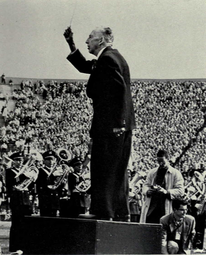
|
| May 2, 1959 |
Louis Elbel died in Ann Arbor.
Perhaps the first tribute paid to the composer after his death came from the Philadelphia Orchestra. On the day that Louis Elbel died, the Orchestra was in Ann Arbor for the May Festival. From the stage of Hill Auditorium, Eugene Ormandy told the audience that Louis Elbel had died. The Orchestra, then played “The Victors”. |
| 1959 | The State of Michigan issued a special memorial proclamation in honor of Louis Elbel. |
